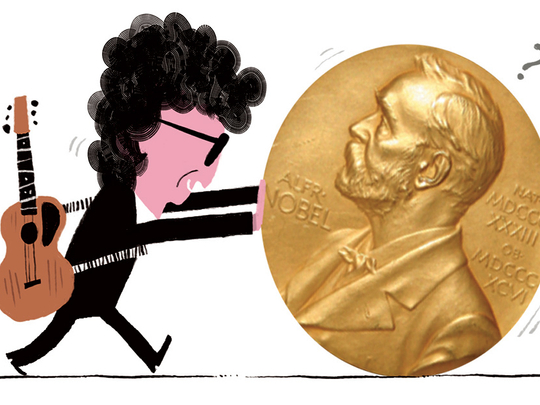
The awarding of the Nobel Prizes for 2016 was completed last week with the (pleasant) surprise of Bob Dylan receiving the prize for Literature. While totally unqualified to assess any literary merits, I personally and subjectively applaud this one, although it confirmed that the Nobel Prize for Literature is not only difficult to predict, it is essentially in the eye of the beholder. The prizes in the other categories were once again given to the usual suspects, that is, white male westerners, drawing another chorus of criticism.
Alfred Nobel left a will stipulating that his fortune be spent one prizes to be given to individuals who will have best served humanity in the fields of Medicine (and Physiology), Chemistry, Physics, Literature, and Peace. This started in 1901, the year after Nobel’s death. In 1969, the Bank of Sweden added a prize in Economics in his memory. In the prize’s 115 years history, there have been a number of controversies, and the statistics point to several problems.
First and foremost, the dearth of women winning the prizes, particularly in the sciences, has been a sore issue. Only two women have received the prize in Physics (one in 1903 and one in 1963), four in Chemistry (in 1911, 1935, 1964, and 2009), one in Economics (in 2009) and 12 (that’s 6 per cent) in Medicine and Physiology. These numbers are indeed shocking, especially when one remembers that 20 per cent of PhDs in the sciences today are awarded to women.
More worrying still is the fact that except for Medicine and Physiology, where the numbers have greatly increased in the last 40 years, in the other science fields (Chemistry, Physics, and Economics) the percentage has remained close to zero! In the Literature and Peace categories, respectively, 12.5 per cent and 16 per cent of the awards have gone to women, with substantial increases in the last few decades. Similarly, non-white men have been rare exceptions in the announcements: only six Latinos and one black.
Secondly, the history of the Nobel Prize is peppered with controversies, chiefly in the Peace and Literature categories, but also in several cases in the science fields. The most famous blunder by the Nobel Prize committee is the omission of Mahatma Gandhi, who was probably more deserving of the Peace award than anyone! On the other hand, the award was given to personalities who either themselves admitted that they did not deserve it (Barack Obama) or were widely sneered at (Henry Kissinger). Other Peace prize recipients were controversial: Menachem Begin, Shimon Peres, Yitzhak Rabin, Anwar Sadat, Yasser Arafat, Al Gore...
The Literature prize has also had its share of polemics, with such luminaries as Tolstoy, Nabokov, Chekhov, Twain, Bellow, and others passed over, while obscure authors from Sweden and Europe receiving the prestigious award: ever heard of Herta Muller? Eyvind Johnson and Harry Martinson? This has prompted accusations of Eurocentrism, boosted by the secretary of the spokesman for the Swedish Academy (which awards the Prize for Literature), who in 2008 stated that “Europe still is the centre of the literary world.” (He resigned from the Academy in 2009.)
In the sciences too there have been some errors, though not nearly as many. Indeed, how could the Nobel Prize (or any prize) be given to the physiologist who developed frontal lobotomy? Or to the scientist who, having developed the technique for producing ammonia (which has positive applications in agriculture), ran the German chemical weapons programme during the First World War? More minor controversies in the sciences included the omission of principal contributors to a topic for which the prize was given; sometimes the recipients themselves acknowledged that others should have shared the prize with them.
What is the problem, and can it be solved?
First, when people dismiss Nobel Prizes out of hand because “Menachem Begin received it”, I stress that we must differentiate between the science categories and those of Peace and Literature. The former are largely objective and credible, the latter are much more subjective and sometimes politically biased. The Economics Prize is not fully objective and rigorous, but it is much closer to the sciences than to Peace and Literature.
Secondly, one problem with the Nobel Prize is that it cannot be given posthumously. But confirmation of a breakthrough or prediction in the sciences must often await decades, by which time the relevant scientists may have died. For example, in recent months, the hashtag #NobelforVeraRubin has circulated, a campaign to give the prize to Vera Rubin (who is now 88) as she has done more than anyone to convince the astrophysics community of the veracity of dark matter. But since we must await the discovery of dark matter, Vera Rubin may never get the prize.
The third problem is that the prize is limited to three recipients in any given year and (except for Peace) cannot be given to organisations. This rule has become detrimental today, since much science is done by large international collaborations. This problem was seen when the Higgs boson was discovered in 2012 by several teams totalling thousands of researchers, but the prize was given to two theorists!
I do not agree with those who have called for the Nobel Prize to be scrapped because of the above anomalies. Its advantages far outweigh its shortcomings and errors. Indeed, every year it draws attention to research and contributions of various kinds; it ignites the dreams of youngsters, and it leads to healthy discussions of these issues. Some changes should be made to its rules and procedures, but the prize should be kept.
Nidhal Guessoum is a professor of physics and astronomy at the American University of Sharjah. You can follow him on Twitter at: www.twitter.com/@NidhalGuessoum.









